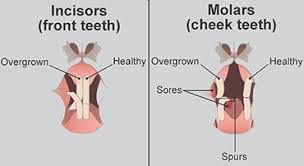Caring for your Rabbit

Rabbits are extremely popular pets. They do really well as outdoor pets but more and more we are seeing them as indoor pets as well. Rabbits have fewer problems with litter training than a lot of cats do. The only thing you have to watch out for is their love of chewing. Not only can it cause a lot of damage to expensive electronics it can be dangerous if they chew a cord carrying high voltage!
Rabbit’s teeth are very complicated, different teeth have very different roles and a small problem in one area can can quickly avalanche to a very serious problem. You will be familiar with the four large incisors that rabbits have at the front of the mouth, the classic bugs bunny teeth. These teeth are used to chop material into pieces small enough to move back to the cheek teeth. The cheek teeth are a row of teeth with a square top and a long rectangular body. These spend a long time grinding down the food so it is ready to be processed.

Rabbits teeth grow from a bud at the very bottom. The amazing thing about these teeth is they continue to grow throughout their lifetime. This means they constantly have to eat food that requires lots of chewing to keep their teeth healthy. An inappropriate diet leads to reduced tooth wear and the teeth simply grow too long.
The best diet for rabbits consists of good quality hay with the right mix of nutrients. Some types of hay are too rich for a lot of rabbits (like lucerne hay) and some are too poor in nutrients like straw. Looks for hay bales name meadow, grass or timothy these should have the right balance of nutrients but still require lots of chewing to get the goodness out. Pellets provide a very concentrated amount of nutrients but do not require a lot of chewing. They are a bit like fast food in that they taste great, and are easy to eat, but not the ideal diet. Fresh leafy veggies are good as part of the diet but can be too low in fibre to keep the gut moving properly.
So how do you know if you are getting it right for your rabbit? As part of your pets yearly check we will closely examine their mouth and the teeth. We can often find mis-shaped molars, spurs and cuts in the cheeks that tell us something is wrong. Dental x-rays or even a full head CT scan give the best answer of what is happening at the top and the bottom of the teeth and how they’re affecting the jaw bones.
There are a few things you can look out for at home. If your rabbits’ gut is healthy they will produce nice dry well formed pellets frequently. Any break in this routine can be a sign of problems. Also look out for slobber covered jaws and saw eyes these are also a sign of dental disease.
For more information contact us, or book an appointment online
 Nav
Nav
 Book Online
Book Online
